Apricot Nutrition Facts
Apricot Nutrition Facts and Health Benefits
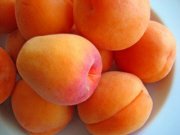 Apricots, along with many of the fruits and vegetables are nutrient dense. This means for the amount of calories they have, they contain a lot of minerals, nutrients and vitamins which are beneficial to our bodies. Apricots contain Dietary Fiber, Protein, Vitamin A, Vitamin C, Calcium, Iron, Vitamin E, Vitamin K, Thiamin, Riboflavin, Niacin, Vitamin B6, Folate, Pantothenic Acid, Magnesium, Phosphorus, Potassium, Zinc, Copper, Magnesium and some Carotenoids.
Apricots, along with many of the fruits and vegetables are nutrient dense. This means for the amount of calories they have, they contain a lot of minerals, nutrients and vitamins which are beneficial to our bodies. Apricots contain Dietary Fiber, Protein, Vitamin A, Vitamin C, Calcium, Iron, Vitamin E, Vitamin K, Thiamin, Riboflavin, Niacin, Vitamin B6, Folate, Pantothenic Acid, Magnesium, Phosphorus, Potassium, Zinc, Copper, Magnesium and some Carotenoids.
Of theses, apricots are especially a good and in some cases an excellent source of Dietary Fiber, Vitamin A, Vitamin C, Iron, Potassium and Copper. All these minerals, vitamins and nutrients play important roles in our bodies. We will briefly take a look at the health benefits we get from consuming apricots. First of all, research have found out that of all the foods, apricots contains the highest amount and variety of carotenoids.
So what are these carotenoids? They are antioxidants which help protect against cancer, prevent heart disease and reduce LDL "bad" cholesterol levels in our blood stream. Beta-carotene also found in apricots reduce the risk of strokes and cardiac problems. In fact, not only is beta-carotene just found in apricots, but they are rich in this antioxidant. Apricots are also rich in other antioxidants; Vitamin A and Vitamin C.
 Vitamin A is important in maintaining healthy eyes, thereby reducing the risk of eye related diseases such as macular degeneration where blood supply to the eyes would have been damaged. Not only do apricots aid in maintaining healthy vision, but also in the treatment of anemia. This is due to their Iron and Copper content. These two minerals aid the body in the production of hemoglobin.
Kernels are the seeds of apricots which can be used to produce oil. This oil is useful in many ways including the treatment of earache.
Vitamin A is important in maintaining healthy eyes, thereby reducing the risk of eye related diseases such as macular degeneration where blood supply to the eyes would have been damaged. Not only do apricots aid in maintaining healthy vision, but also in the treatment of anemia. This is due to their Iron and Copper content. These two minerals aid the body in the production of hemoglobin.
Kernels are the seeds of apricots which can be used to produce oil. This oil is useful in many ways including the treatment of earache.
The rest of the uses are mentioned further down this article. The other good thing about apricots is their Dietary Fiber content. Because they are a good source of fiber, they are used in the treatment of constipation and irregular bowel movements. Finally, apricots, especially dried apricots, are rich in potassium, which makes aid in preventing high blood pressure.
From all this, we can deduce that apricots, because of the minerals, nutrients and vitamins found in them, not only are they great for a healthy eating lifestyle, but can also help treat skin diseases, earache, anemia, fevers, constipation and indigestion. They also help in regenerating body fluids, quench thirst as well as detoxify our body by flushing out harmful toxins. Apricots, like most fruits, can be eaten raw, dried, in jams, jelly or juice form.
We will now take a look at some apricot nutrition facts of the different forms in which you can eat apricots. The percent daily values are based on a 2,000 calorie diet. Your values may be higher or lower depending on your calorie needs.
Apricot Nutrition Facts
Raw apricot nutrition facts show it, like most fruits is low in calories but rich in nutrients, minerals and vitamins. A raw apricot is an excellent source of the antioxidant Vitamin A and a good source of Vitamin C, Dietary Fiber and Potassium.
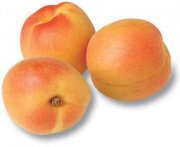
- Serving size- 155g
- Calories- 74
- Calories from Fat- 5
- Total Fat- 1g, 1% of DV
- Saturated Fat- 0g
- Cholesterol- 0mg
- Sodium- 2mg, 0% of DV
- Total Carbohydrate- 17g, 6% of DV
- Dietary Fiber- 3g, 12% of DV
- Sugars- 14g
- Protein- 2g
- Vitamin A- 60% of DV
- Vitamin C- 26% of DV
- Calcium- 2% of DV
- Iron- 3% of DV
- Vitamin E- 7% of DV
- Vitamin K- 6% of DV
- Thiamin- 3% of DV
- Riboflavin- 4% of DV
- Niacin- 5% of DV
- Vitamin B6- 4% of DV
- Folate- 3% of DV
- Pantothenic Acid- 4% of DV
- Magnesium- 4% of DV
- Phosphorus- 4% of DV
- Potassium- 11% of DV
- Zinc- 2% of DV
- Copper- 6% of DV
- Magnesium- 6% of DV
Dried Apricot Nutrition Facts
Dried apricot nutrition facts reveal that they again are an excellent source of Vitamin A. They provide you with 72% of your recommended daily allowance. They are also a good source of Dietary Fiber, Vitamin E, Iron, Copper, Manganese and a very good source of Potassium. Their high Dietary Fiber content as compared to their volume ratio makes them be used in helping to treat constipation or induce diarrhea. In fact, if you are constipated and eat just three apricots, you may actually begin to feel the relieving effects.
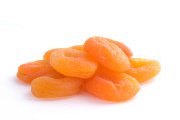
- Serving size- 100g
- Calories- 241
- Calories from Fat- 4
- Total Fat- 1g, 1% of DV
- Saturated Fat- 0g
- Cholesterol- 0mg
- Sodium- 10mg, 0% of DV
- Total Carbohydrate- 63g, 21% of DV
- Dietary Fiber- 7g, 28% of DV
- Sugars- 53g
- Protein- 3g
- Vitamin A- 72% of DV
- Vitamin C- 2% of DV
- Calcium- 6% of DV
- Iron- 15% of DV
- Vitamin E- 22% of DV
- Niacin- 13% of DV
- Potassium- 33% of DV
- Copper- 17% of DV
- Manganese- 12% of DV
Apricot Nutrition Facts: Kernel
The apricot kernel is the seed of the apricot. It can be used to produce an oil that is mostly used for it's sedative relief to strained muscles and to aid in the healing of wounds. The oil is also used as cooking oil. The nutrition facts on the kernel oil show that it's a source of Vitamin E, which is important for the good health of your skin.
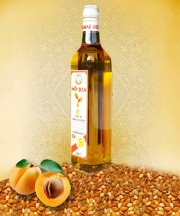
- Serving size- 1 tbsp, 13g
- Calories- 119
- Calories from Fat- 119
- Total Fat- 14g, 21% of DV
- Cholesterol- 0mg
- Sodium- 0mg
- Total Carbohydrate- 0g
- Dietary Fiber- 0g
- Sugars- 0g
- Protein- 0g
- Vitamin A- 0% of DV
- Vitamin C- 0% of DV
- Calcium- 0% of DV
- Iron- 0% of DV Vitamin E- 3% of DV
Apricot Nutrition Facts: Jam
The apricot jam, like most jams is sweet, unless if it is made for diabetics and is sugar-free. The apricot jam nutrition facts show that it is mostly a source of Dietary Fiber, which is important in aiding with a healthy digestive system.
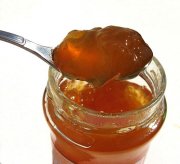
- Serving size- 100g
- Calories- 227
- Calories from Fat- 3
- Total Fat- 0.3g, 0% of DV
- Saturated Fat- 0g
- Sodium- 0mg
- Total Carbohydrate- 56g, 19% of DV
- Dietary Fiber- 2g, 8% of DV
- Sugars- 56g
- Protein- 0.4g, 1% of DV
Apricot Nutrition Facts: Juice Nectar
Apricot nutrition facts on its juice nectar show that it is absolutely an excellent source of Vitamin C. It provides you with a whooping 228% of your recommended daily allowance. It is also an excellent source of Vitamin A and a source of Dietary Fiber, Calcium, Iron, Potassium and Copper.

- Serving size- 250ml
- Calories- 141
- Calories from Fat- 2
- Total Fat- 0g
- Saturated Fat- 0g
- Cholesterol- 0mg
- Sodium- 8mg
- Total Carbohydrate- 36g, 12% of DV
- Dietary Fiber- 2g, 8% of DV
- Protein- 1g
- Vitamin A- 66% of DV
- Vitamin C- 228% of DV
- Calcium- 2% of DV
- Iron- 5% of DV
- Potassium- 8% of DV
- Copper- 9% of DV


